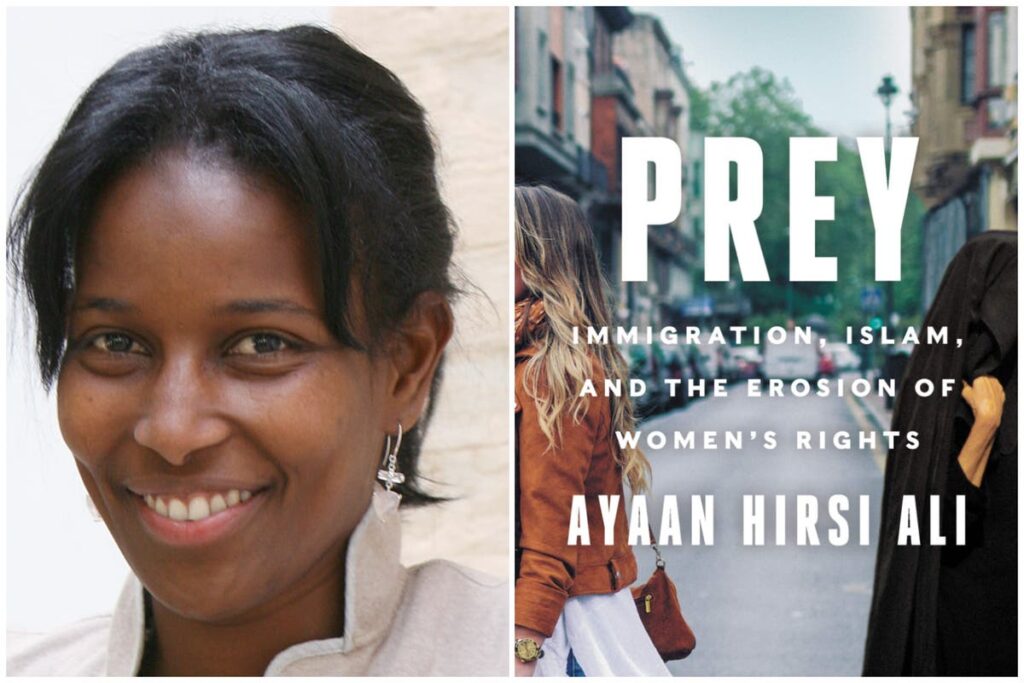Blog Post
Ayaan Hirsi Ali on why European women have become prey for migrants
By Jonathon Van Maren
Ayaan Hirsi Ali’s latest offering, Prey: Immigration, Islam, and the Erosion of Women’s Rights, is an in-depth and superbly reported examination of a subject that Europe’s politicians, media, and law enforcement have been doing their best to ignore and even suppress—that of the victimization of women and girls by Muslim migrants who have been flooding into Europe for years, with a peak influx in 2015 triggering a continental crisis. Until now, the stories of the rapes, grooming gangs, and mass perpetration of sexual violence against European women in places like Cologne—where more than 1,200 women were sexually assaulted and 24 reported being raped during 2015 New Year’s Eve celebrations in Germany—have been sparsely and sporadically reported.
Hirsi Ali’s biography is worth noting, as her life experiences render her uniquely qualified to take on this subject. Born in 1969 in Mogadishu, Somalia, Hirsi Ali had lived in Saudi Arabia, Ethiopia, and Kenya by the time she reached adulthood. At the age of five, her grandmother hired a man to subject her to female genital mutilation, a process she described in gut-wrenching detail in her memoir Infidel. In 1992, she fled to the Netherlands to escape a forced marriage; then worked as an interpreter with Somali women in asylum centers; earned a degree in political science from the University of Leiden; and became an outspoken critic of the treatment of women in Islamic societies. From 2003 to 2006, she served as a Dutch MP.
Famously, she worked with director Theo Van Gogh to produce the short film Submission in 2004. When he was murdered later that year by a Dutch Moroccan Islamist, the killer stabbed a death threat to Hirsi Ali into Van Gogh’s chest. Her criticisms of integration policy made her a target of progressives as well, and after a public debate about the validity of her Dutch citizenship over details on her asylum application, she relocated to the United States. She now serves as a research fellow at Stanford’s Hoover Institution and is the founder of the AHA Foundation. In addition to her two memoirs, Infidel and Nomad, she has also authored Heretic (2015) and The Challenge of Dawa (2017).
In some ways, Prey is the most inflammatory of them all. Hirsi Ali’s thesis is a straightforward one: the mass migration of men from misogynist Muslim cultures is a threat to the hard-won rights of women in Europe. Since 2015, nearly two million people have arrived illegally; three million since 2009. Two-thirds are male and 80% of those applying for asylum are under the age of 35. Millions of young men arriving in Europe from Muslim cultures is having an impact on the native populations, and it seems ludicrous that saying so is controversial.
It is to Hirsi Ali’s credit that Prey is as even-handed as it is—with this subject material, she could have written a truly incendiary book. She describes the “no-go zones” in major European cities, which women now avoid for fear of being harassed or worse. She does the painstaking detective work necessary to piece together the data on sexual violence—a 17% increase in rapes in France between 2017 and 2018; a 12% increase in Sweden in 2016; a 41% increase in Germany in 2017; a 11.8% increase in sexual offenses in Austria since 2009. In Denmark, non-Westerners made up two-fifths of rape convictions and “between a quarter and a third of groping convictions” despite making up less than 13% of the population.
And then there are the Rotherham rape gangs, which wracked up over 1,500 child victims while most authorities stayed silent for fear of being labeled racist; the mass sexual assaults in Cologne, for which only two men—a 26-year-old Algerian and a 21-year-old Iraqi—were convicted of sexual assault and each given one year probation; and a series of savage, sexually-motivated murders across the continent. These assaults have taken place in malls, fast food bathrooms, and in public. Sentences for the few perpetrators actually brought to justice are generally inconsequential, with the differing cultural values of the assailant sometimes specifically cited. Hirsi Ali says these light sentences actively encourage further offences, and some migrant men spread the word that European women are easy prey, while the consequences of getting caught are often just community service or a short stint in what they consider to be comfortable prison accommodation relative to those in their home countries.








